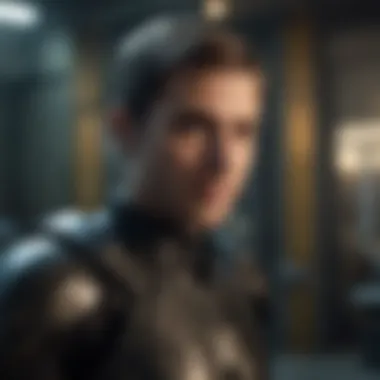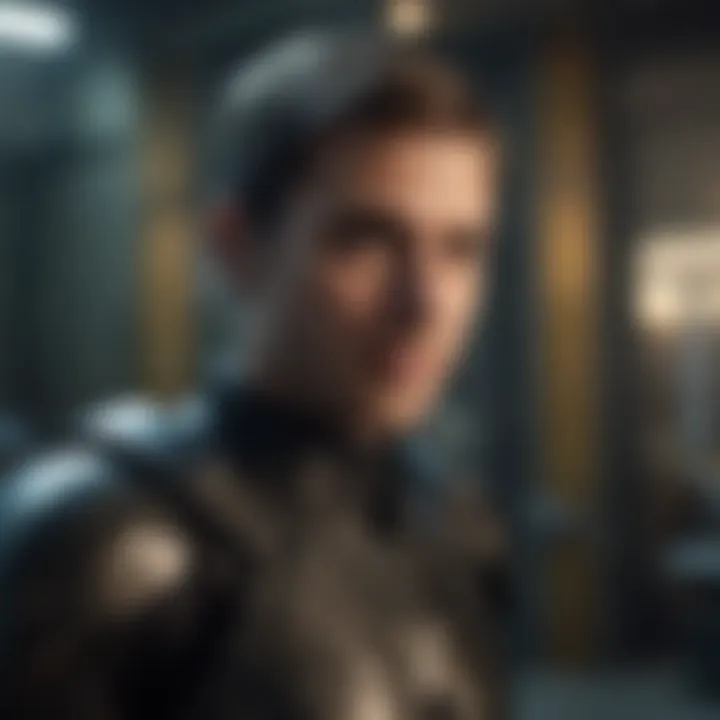In-Depth Analysis of Agents of Shield: Complete Series Review


Intro
In the ever-expanding Marvel universe, Agents of Shield carved out a unique niche. This series, which aired for seven seasons, not only complemented the larger superhero narrative but also built its own intricate world filled with espionage, technology, and rich character development. The following sections will present a comprehensive view of this beloved show, scrutinizing its intricacies and impact on viewers.
Overview of the Entertainment
Background Information
Agents of Shield debuted in 2013, just a few months after the wildly successful The Avengers film. Created by Joss Whedon, Jed Whedon, and Maurissa Tancharoen, the show aimed to deepen the Marvel Cinematic Universe by exploring stories outside of the main hero's journeys. From the start, it intrigued fans with a mix of spy thrills and adventure that moved beyond traditional superhero narratives. The initial premise revolved around the covert group, led by Agent Phil Coulson, tasked with monitoring alien technology and keeping the world safe from emerging threats.
Brief Synopsis
The show follows the adventures of S.H.I.E.L.D. agents, as they navigate a world filled with super-powered beings and unpredictable enemies. Over the seasons, the narrative expanded to grapple with themes of trust, loyalty, and identity, culminating in epic battles that tested the characters' resolve and integrity. The series saw the team face off against various villains, including Hydra, Inhumans, and even time-traveling foes.
Key Creators and Cast
The series boasted a talented crew, including actors like Clark Gregg, who reprised his role as Phil Coulson, and Chloe Bennet as Daisy Johnson. Writers and directors consistently brought their expertise, with the likes of Joss Whedon lending his vision to the pilot. The mix of seasoned actors and fresh talent propelled the show and engaged audiences throughout its run.
Analysis and Critique
Performance and Writing Evaluation
From its narrative heft to strong performances, Agents of Shield presented a sturdy foundation upon which its story arcs thrived. As the seasons progressed, the show took daring twists that kept viewers on their toes. The early seasons were heavily serialized, fleshing out character backgrounds and relationships. In later seasons, the approach shifted, weaving standalone episodes with overarching plots, allowing each team member’s story to shine in its own right.
Comparison to Similar Works
Unlike other superhero shows that often lean on familiar tropes, Agents of Shield sought originality. It stood out for its blend of humor and drama, drawing inspiration from spy thrillers while maintaining the quirkiness emblematic of Whedon’s work. The pacing and tone often reflected earlier genre pieces like Alias but added a unique twist with its connections to Marvel's broader narrative landscape.
Key Themes and Styles
Thematically, the series examined issues of morality, ethics, and family. The exploration of identity through various characters, especially in the context of the Inhumans and other enhanced individuals, prompted discussions about the nature of humanity. Visuals evolved throughout the series, from grounded realism in earlier seasons to a more fantastical aesthetic in later runs, aligning with the show’s ever-expanding universe.
Episode/Scene Breakdown
Notable Scenes and Events
- Pilot Episode: The introduction of Agent Coulson and his team set the tone, encapsulating the balance of humor and action that would define the show.
- The Fall of S.H.I.E.L.D.: A pivotal moment that showcased the internal conflict and external pressures faced by the team, shifting dynamics dramatically.
- Closure of Key Arcs: Significant character deaths and resolutions provided emotional weight and paid homage to the sacrifices made.
Character Arcs Analysis
Agents like Fitz and Simmons underwent profound transformations, showcasing growth shaped by tragedy and loyalty. The exploration of their relationship brought depth, enriching the narrative fabric, and catering to fans' emotional investments.
Audience Reception and Ratings
The show often garnered mixed reviews at first, but its ratings improved dramatically as viewers recognized its depth. Ratings on Rotten Tomatoes fluctuated, with major episodes receiving high praise. Its ability to resonate with passionate fans showcased its enduring impact within the Marvel realm.
Recommendations and Epilogue
For fans of espionage and character-driven narratives, Agents of Shield is a treasure trove. It's a series worth committing to, especially for those who appreciate complex character arcs intertwined with action-packed storytelling. As we reflect on its journey through the Marvel universe, Agents of Shield stands as a testament to the power of narrative depth, forever leaving its mark in the hearts of viewers.
"It’s not just a story about superheroes; it’s a narrative about choices, identity, and what it means to be human."
Whether you are a casual viewer or a die-hard fan, the series undeniably invites viewers into a rich, layered world that, while it may have its bumps, ultimately delivers an experience worth exploring.
Preamble to Agents of Shield
In the landscape of television programming, few series manage to blend intricate storytelling with deep character development quite like Agents of Shield. This show, birthed from the expansive universe of Marvel Comics, has carved out its own niche, reflecting both the grandeur and the personal stakes of superhero narratives.
The importance of this section cannot be overstated. Agents of Shield serves as a bridge between the cinematic experiences of the Marvel world and the intricacies of serialized television. It expands upon the lore surrounding iconic characters, enabling fans to delve deeper into stories that might otherwise remain untold, and giving context to events seen in blockbuster films.
One of the immediate benefits of diving into Agents of Shield is the presence of familiar faces from the Marvel Cinematic Universe (MCU), such as Phil Coulson, played by Clark Gregg, who first captured audiences' hearts in The Avengers. His transition from a secondary character to the series' central figure symbolizes not only a narrative shift but also the potential for character evolution that can occur outside the film context.
Within this introduction, we will consider:
- The show's ability to tackle complex themes, such as loyalty and family against a backdrop of high-stakes action.
- The intricate relationships between characters that deepen viewers' investment in their journeys.
- How these factors contribute to the wider Marvel mythos, enhancing the viewer's overall experience.
"The art of creating a successful television series lies in its ability to resonate on multiple levels with its audience, a feat that Agents of Shield accomplishes through its compelling storytelling and rich character dynamics."
As we embark on this comprehensive examination, it becomes evident that Agents of Shield is not merely a companion piece to the MCU but a work deserving of serious scrutiny and appreciation in its own right.
The Origins of Agents of Shield


To truly appreciate the richness of Agents of Shield, it’s vital to step back and understand its origins. This foundational aspect not only reveals how the series came to be, but also sheds light on its intertwining with the expansive Marvel Cinematic Universe (MCU). The genesis of Agents of Shield reflects strategic decisions in storytelling and character development, resonating deeply with fans and adding layers to the Marvel lore.
Development Process
The development of Agents of Shield was as intriguing as the show itself. It all began with The Avengers in 2012, a film that set the stage for S.H.I.E.L.D. to leap off the big screen onto the small one. Joss Whedon, the series’ creator, took on this task, intending to craft a story that felt vibrant and connected, yet independent from the major film arcs.
Behind the scenes, many creative trials molded the series. Whedon aimed to explore lesser-known characters while reflecting on the world post-The Avengers, grappling with the consequences of heroic actions. Writers like Maurissa Tancharoen and Jed Whedon collaborated closely, devising a structure that wove episodic tales into an overarching narrative. This effort required meticulous planning to maintain continuity with the MCU, a challenge that often necessitated deft storytelling.
Despite some initial skepticism over whether a TV series could sustain the high standards set by Marvel films, Agents of Shield ultimately forged its path, displaying a unique narrative style. The combination of espionage, superhero elements, and character depth made it not just another spin-off but a significant addition to the Marvel family.
Connection to the Marvel Cinematic Universe
The relationship between Agents of Shield and the MCU is integral to understanding its significance. As a narrative bridge, the series fleshes out the events of the films, enriching the viewer’s experience. For example, references to the events of Captain America: The Winter Soldier in Season One showcased the show’s commitment to being part of a larger universe. This connection was not merely superficial; it allowed for a more substantial exploration of S.H.I.E.L.D. itself, delving into its history, operations, and moral complexities.
The series’ ability to incorporate characters from the extensive Marvel lore further emphasized its importance. From Maria Hill, portrayed by Cobie Smulders, to the introduction of new characters like Daisy Johnson, every character interaction added to the rich tapestry of stories. It exemplifies the idea that the MCU is more than just films; it’s a continuously evolving narrative full of depth and interconnected arcs.
Moreover, this synergy allowed Agents of Shield to respond to audience reactions while still forging its own identity. The series was unafraid to take creative risks, often embracing the darker themes that are a hallmark of Whedon’s work. This fusion of film and television storytelling offered fans a broader experience, creating a satisfyingly layered universe.
"In the world of superheroes, every detail matters. The roots of Agents of Shield show how interconnected stories can elevate the overall narrative."
In essence, the origins of Agents of Shield played a pivotal role in shaping not just the series itself, but also the Marvel brand as a whole. Understanding the careful crafting of its foundation allows fans to appreciate the nuances and connections that signify its enduring impact.
Overview of Seasons
The "Overview of Seasons" segment plays a crucial role in understanding how Agents of Shield evolved throughout its seven-season run. Each season contributes a distinct chapter to the larger narrative, showcasing the character growth, plot development, and thematic undertones synchronously woven into the fabric of the series. This exploration helps fans and scholars alike to appreciate the intricacies involved in character arcs and overarching storylines. Moreover, it allows for a deeper analysis of how the dynamics shift, respond to outside influences, and the impact of individual decisions that shape the team's fate.
Season One: Foundations
The first season sets the stage for everything that follows. It introduces audiences to a post-Avengers world, where Phil Coulson, presumed dead, refreshes the S.H.I.E.L.D. agency. The season meticulously unfolds the team dynamics, emphasizing their struggle with trust and their commitment to espionage. Challenges arise from various established threats, like Hydra and superheroes going rogue, establishing a foundation of conflict that resonates throughout the series. The first season also serves as an introduction to key characters such as Skye and Leo Fitz, who, despite their initial naivety, develop into stronghold personalities within the team. This foundation is characterized by varied missions, character conflicts, and an introduction into the Marvel Cinematic Universe (MCU), creating interest and anticipation for subsequent seasons.
Season Two: Expansion and Conflict
Moving into the second season, the stakes soar as we dive deeper into the concept of ethical dilemmas within superhero constructs. Here, we witness the full ramifications of betrayal, particularly through the character of Grant Ward. The narrative expands considerably, introducing new players and bringing forth a more complex narrative web. The exploration of the Inhumans emerges, foreshadowing future developments. As relationships deepen and fractures widen, the tension heightens, offering viewers a more intricate portrayal of both loyalty and treachery. This season balances thrilling action with emotional complexity, making the stakes feel more personal and engaging for the audience.
Season Three: Agency Under Siege
By the third season, S.H.I.E.L.D. faces unparalleled challenges. With characters straddling the line between ally and adversary, the siege on the agency reveals the fragile nature of trust within the group. The season delves into the themes of sacrifice, identity, and power, leading to a confrontation with the Inhuman narrative. Phil Coulson's need to maintain stability amidst chaos showcases his leadership evolution. This season also lays the groundwork for pivotal moments that resonate throughout the series, where friends turn into foes and past actions come back to haunt the present. The stakes are at an all-time high, and the narrative crescendos with significant plot twists that leave viewers eager for more.
Season Four: The Framework
In its fourth installment, Agents of Shield introduces the Framework, a virtual reality that challenges both characters and viewers to ponder reality’s perception. The concept cleverly highlights existential themes, exploring a possibility where the characters experience profound moral questions about their identities. This season shuffles perspectives, showcasing how a simplistic yet complex narrative can be spun using varying realities and deep psychological motives. Aida, as a central antagonist, becomes emblematic of the season's thematic tension, as the focus shifts from typical superhero drama to a more introspective journey deconstructing heroism and villainy.
Season Five: The Future and Redemption
The fifth season catapults the characters into the future, creating a rich tapestry of narrative possibility. The thematic heartbeat of redemption resonates strongly, particularly in the arcs of beloved characters trying to reconcile with their past misdeeds. Set in a dystopic future, viewers see characters facing the ultimate consequences of their previous actions. The introduction of new threats, such as the Chronicoms, highlights the shifting dynamics of villainy within the narrative. The exploration of survival against overwhelming odds compels characters to re-examine notions of loyalty and sacrifice. As their world teeters on the edge, alliances are tested and rekindled, creating a juxtaposition of hope amidst despair.
Season Six: New Horizons
With a fresh outlook, the sixth season dives into a new era for S.H.I.E.L.D. The storyline pivots on reconciling the team's past with the present, establishing fresh relationships and motivations while retaining core themes of loyalty and family. The presence of a new antagonist in the form of Sarge presents a mirror to Coulson's character, offering a striking contrast to his leadership style and moral philosophy. The stakes remain high as time becomes both an ally and an adversary. This season highlights growth—the characters evolve not only in power but in understanding themselves and blood ties that bind, showcasing a series that never stops developing.
Season Seven: The End of the Journey
As it wraps up, the seventh season serves as a poignant bookend to the epic tale. It channels the emotional weight of finality as the characters grapple with the impending end. The season revisits key moments and characters from previous encounters, tying up loose ends and providing satisfying resolutions. It heavily focuses on the themes of legacy and continuation, encouraging viewers to reflect on the series' long-lasting impact. With clever nods to previous seasons and character arcs completing, the narrative offers a fitting farewell, encapsulating the essence of the team's evolution from inception to conclusion.
The journey through Agents of Shield, characterized by its intricate and layered storytelling, reveals a depth that transcends typical episodic fare in the superhero genre. Each season captures portions of growth, conflict, and resolution, solidifying its place within the broader Marvel tapestry.
"In a world of heroes and villains, often the line blurs, making us question who truly deserves our loyalty."
As each season builds upon the last, the series culminates in a rich narrative that not only entertains but also provokes thought, leaving behind a legacy few shows can rival.
Character Analysis
The analysis of characters in Agents of Shield offers a deep insight into how personal choices shape not just the narrative but also the moral fabric of the series. Characters evolve in response to their circumstances, grappling with identity, loyalty, and the consequences of their actions. Understanding these dynamics enriches the viewing experience and reveals the layered storytelling that distinguishes the series within the Marvel universe.
Phil Coulson: A New Kind of Leader
Phil Coulson, portrayed by Clark Gregg, embodies the complexities of leadership in a world filled with chaos and uncertainty. Initially seen as a desk agent, Coulson's character arc transforms him into a resilient leader who navigates personal loss and immense responsibility. His ability to blend authority with empathy sets him apart in a genre often dominated by archetypical heroes.
To Coulson, leadership isn’t about exercising power. He believes it hinges on camaraderie and shared purpose. This is evident in his relationships with team members, which are marked by mutual respect and unwavering loyalty. As he faces ethical dilemmas, his decisions often reflect a balance between idealism and pragmatism; his leadership style evolves as he confronts both human and extraterrestrial threats.
"Leadership is not a position; it’s an action."
Coulson's persistence and kind-hearted approach resonate deeply with viewers, making him a beacon for those around him, even in the darkest situations.


Melinda May: The Silent Protector
Melinda May, known as the "Calvary," shines a light on the theme of trauma and resilience. Played by Ming-Na Wen, her near-mythical reputation creates expectations that weigh heavily upon her. Throughout the series, May struggles with her past, adding depth to her seemingly stoic exterior. Her character challenges the stereotype of a silent warrior; beneath that tough shell lies a deeply caring soul.
May's protective instincts for her team are her driving force. She often assumes a guardian role, ready to ensure their safety, even at a personal cost. With minimal words but striking actions, she conveys her commitment to those she defends. This duality makes her a significant character who embodies strength coupled with vulnerability.
Skye/Daisy Johnson: Identity and Transformation
Skye, later known as Daisy Johnson, serves as a powerful narrative of self-discovery and evolution. Initially introduced as a rebellious hacker, her character grows profoundly throughout the series, reflecting her journey of uncovering both her Inhuman abilities and her true self. Played by Chloe Bennet, Daisy’s transformation resonates with an audience grappling with questions of identity in a rapidly changing world.
Daisy’s arc encapsulates themes of acceptance and belonging. Her struggles to reconcile her human side with her Inhuman heritage form a poignant tale of adaptation. As she learns to channel her powers, the audience witnesses her transformation from a scrappy rookie to a proficient agent who embraces her role in protecting her friends and the wider world.
Leo Fitz and Jemma Simmons: A Scientific Bond
The relationship between Leo Fitz and Jemma Simmons is one that transcends the typical portrayal of love in television. Although they start as colleagues, over five seasons, they evolve into a partnership grounded in intellect and respect. Fitz, played by Iain de Caestecker, and Simmons, portrayed by Elizabeth Henstridge, demonstrate that love can be as much about shared passions and collaborative problem-solving as it is about romance.
Their scientific partnership faces numerous challenges, particularly throughout Season 3 when their differences threaten their bond. But their unwavering commitment helps them navigate crises, illustrating the strength that can come from differences. This relationship nicely reflects how teamwork can often lead to both personal and professional triumphs.
Ward: The Betrayer
Grant Ward, played by Brett Dalton, embodies the archetype of betrayal and its repercussions. Initially viewed as a loyal agent, Ward's character takes a darker turn, revealing the complexities of his background and motivations. His eventual alliance with Hydra introduces an intense conflict that shakes the foundations of trust among his team.
Ward's metamorphosis from a beloved teammate to one of the series' primary antagonists highlights themes of loyalty and deception. His character challenges audiences to grapple with the idea of inherent good versus evil, culminating in a rich analysis of the psychological aspects of betrayal. Just when you think you have figured him out, he proves there are often more layers to individuals than meet the eye.
Intricate Plot Lines
The intricate plot lines presented throughout Agents of Shield serve as the backbone of its narrative structure, guiding audiences through the mazes of mystery, conflict, and transformation. As fans dive into the series, they encounter twists that not only thrill but also deepen their understanding of character motivations and broader themes. The way these plot lines intertwine often reflects the complexities of real-life relationships and situations, providing viewers with a sense of realism amidst the fantastical elements of the Marvel Cinematic Universe.
When discussing intricate plot lines, one finds it essential to zoom in on the following key components:
- Narrative Complexity: The show handles multiple story arcs simultaneously, allowing nuanced exploration of its characters’ lives and choices. This format keeps viewers on their toes, sparking discussions and theories within fan circles.
- Character Development: Each intricate plot line is tied to character growth, enabling significant development arcs that result in profound personal transformations. The stakes feel higher as characters grapple with moral dilemmas and relationships, making their journeys relatable.
- Interconnectedness: Plot lines often connect to the larger Marvel narrative, blending various elements of the universe. This interconnectedness invites viewers to appreciate the series not just as a standalone entity but as a puzzle piece in a grander scheme.
"Agents of Shield stands out by not just telling a story, but weaving a tapestry of characters and events that resonate deeply with its audience."
This exploration is crucial for understanding the thematic essence of the series as it unfolds throughout various seasons. Now, let's delve into specific plot lines that have defined the series.
S.H.I.E.L.D. vs. Hydra
The ongoing battle between S.H.I.E.L.D. and Hydra is not just a clash of organizations; it symbolizes the eternal conflict between good and evil. Hydra, with its shadowy dealings and deeply embedded ideals of control, represents the darker aspects of human nature. As S.H.I.E.L.D. strives to preserve order and protect humanity, this struggle becomes a gripping focal point of the series.
Through this narrative, viewers witness:
- Moral Ambiguity: Characters often face difficult choices where the lines between right and wrong blur, leading to rich storytelling ripe with tension and emotional weight.
- Betrayal and Trust: The presence of Hydra among S.H.I.E.L.D. agents threads the theme of betrayal, compelling characters to constantly evaluate their loyalties.
- Legacy and Heritage: The historical ties between these two organizations bolster the story. Audiences are drawn into the lore, sparking curiosity about the backgrounds of pivotal figures.
The Inhuman Connection
One of the most compelling aspects of Agents of Shield is its exploration of the Inhumans. Initially introduced as a solution to the Inhumanity stemming from superheroes' powers, the Inhumans unravel a broader conversation about identity and belonging.
Key takeaways include:
- Power and Responsibility: The awakening of Inhuman abilities raises questions about responsibility and the ethical implications of power. The series poses answers to what it truly means to be heroic in a world filled with superpowers.
- Diversity of Experience: Each character's journey as an Inhuman allows the show to explore themes of acceptance and what it means to be different in society.
- Conflict and Adaptation: The friction between humans and Inhumans reflects real-world dynamics and challenges faced by marginalized groups, encouraging viewers to think critically about societal divides.
Time Travel and Reality Themes
As simply put, time travel within Agents of Shield is not a mere gimmick. It serves as a profound narrative device to explore the consequences of choices and the fluidity of time itself. These plot lines provoke thought about fate and free will, resonating with the show’s overarching themes.
Examining the role of time travel offers:
- Regret and Revision: Characters are often thrust into situations where they can alter past events, highlighting their regrets and desires for redemption.
- Multiple Realities: The show taps into the idea of parallel universes, echoing notions of alternate lives and the impact of seemingly small decisions.
- Narrative Infinity: By mastering the concept of time travel, the series opens up infinite possibilities for storytelling, keeping the audience captivated and eager for what lies ahead.
In summary, the plot lines in Agents of Shield are carefully crafted to resonate on multiple levels, drawing audiences into the intricacies of their intertwining narratives. Each storyline not only enriches the series but also deepens the viewer's engagement with the characters and overarching themes.
Thematic Exploration
The thematic exploration within Agents of Shield provides a rich tapestry of narrative depth, reflecting not just the series' storylines, but also the underlying principles that resonate strongly with its audience. Major themes like family, loyalty, heroism, and the intersection of technology with humanity shape the viewer's experience and contribution to the overall discourse surrounding superhero narratives. Each theme acts as a lens through which the character’s motivations and actions can be examined, making it crucial for a thorough understanding of the show.
The significance of these themes is twofold. Firstly, they enhance the emotional stakes of the narrative, allowing audiences to connect personally with the characters and their journeys. Secondly, they prompt critical engagement with broader societal issues, revealing how the show mirrors contemporary dilemmas. Audiences are not just passive observers; they are compelled to reflect on their values and beliefs, making Agents of Shield more than just entertainment—it becomes a commentary on modern life.
Family and Loyalty
One of the most prominent themes, family and loyalty, is interwoven throughout the fabric of the show. At its core, Agents of Shield illustrates that family extends beyond blood relations; it encapsulates found families, built through shared experiences and struggles. Phil Coulson's team exemplifies this concept, where members demonstrate unwavering loyalty and sacrifice for each other.


Characters like Melinda May protect not only their colleagues but also create bonds that can rival familial ties. Their loyalty is tested throughout various seasons, often pushing them into tough moral dilemmas that immerse them deeper into the sadness of personal stakes and relationships.
"In a world where loyalty can be as fleeting as a shadow, Agents of Shield highlights that true loyalty lies in actions more than words."
The emotional weight of betrayal is palpably felt through characters like Grant Ward, whose actions force team members to confront their ideals about loyalty. The push and pull between loyalty to one’s team and to one’s own past creates a captivating dynamic that keeps viewers engrossed.
The Nature of Heroism
Agents of Shield questions traditional notions of heroism. The series challenges the simplistic dichotomy of heroes versus villains, revealing that heroism is often muddied by personal flaws and ethical gray areas. Characters like Daisy Johnson embody this complexity as they evolve from a naive hacker to a determined leader confronting the consequences of her decisions.
All the while, the standard trope of a superhero's strength is contrasted with vulnerability. For example, while Coulson showcases leadership, he grapples with feelings of inadequacy and loss from his past. By stripping away glorified notions of heroism, Agents of Shield invites its audience to ponder: What does it mean to be a hero in a flawed world? Real heroism often emerges not from grand gestures but from everyday actions of courage and compassion.
Technology and Humanity
The interplay between technology and humanity is another significant theme that Agents of Shield scrutinizes. As technology evolves in the series—from the introduction of advanced gadgets to the concept of artificial intelligence—the show raises ethical questions regarding dependence on technology and its consequences.
This theme is particularly evident in the later seasons, where characters like Leo Fitz struggle with the implications of using technology for good while understanding its potential for destruction. The emergence of Aida, an artificial intelligence, illustrates the blurred lines between human and machine, challenging characters to confront their fears about technological entities that grow closer to humanity with each iteration.
The series subtly argues that while technology can enhance human capabilities, it can also expose vulnerabilities. It positions technology as a mirror reflecting humanity's strengths and weaknesses.
In summary, Agents of Shield employs thematic exploration as a robust vehicle for telling stories that resonate on a personal level while engaging with broader societal issues. Through its intricate examination of family dynamics, the nature of heroism, and the relationship between technology and humanity, the series stands out not only as a superhero narrative but as a profound discussion on what it means to be human in a complex world.
Cultural Impact and Reception
The cultural impact and reception of Agents of S.H.I.E.L.D. holds considerable significance, both as a television series and as a component of the Marvel universe. This section delves into how the series resonated with audiences and critics alike, shaping discussions around superhero narratives, representation, and innovation within the genre. The complex interplay of fandom, media, and storytelling proves to be crucial in understanding its legacy.
Audience Reception
From its debut, Agents of S.H.I.E.L.D. attracted a dedicated following, thanks in part to the show's connection to the Marvel Cinematic Universe (MCU). Fans were eager to see how this series would expand on the narratives introduced in the films. This anticipation was rekindled when characters from the MCU occasionally made appearances, creating a sense of continuity that viewers cherished.
Nevertheless, audience reception was a mixed bag. The first season, while generally well-received, struggled to maintain momentum in terms of ratings. Many fans felt that the show initially lacked the gripping plots characteristic of its cinematic counterparts. As the seasons progressed, however, the writing matured, leading to more compelling arcs that integrated a deeper exploration of identity and loyalty. This change won over many skeptics, resulting in a passionate fanbase that actively participated in online discussions, shared theories, and celebrated character development.
"The ability of S.H.I.E.L.D. to evolve both in storytelling and character arc is what created lasting investment from the audience."
Social media platforms like Facebook and Reddit played a crucial role in fostering community discussions, allowing fans to unite over shared favorites and grievances. This connection between audience and show not only transformed how fans interact with content but also prompted discussions on representation, particularly concerning female characters and diverse storylines. The engagement helped shape subsequent seasons, as the network seemed to respond to fan desires for richer narratives.
Critics' Reviews and Awards
Critics have had a fascinating relationship with Agents of S.H.I.E.L.D.. Initially, the show garnered a fair amount of skepticism, particularly for perceived initial pacing issues and character development. Early reviews highlighted a sense of confusion regarding its identity, caught between episodic structure and overarching plotlines. Over time, as the series found its footing, critics began to appreciate the ambitious storytelling. Review platforms reported a marked increase in favorable critiques following the introduction of more complex themes, such as sacrifice and morality.
Several awards and nominations also signified its recognition within the television landscape. The series bagged nominations for the Saturn Awards and received praise from various geek-oriented outlets. Notably, it won the critic's nod for its inclusion and portrayal of complex female characters, highlighting the growth and resilience of its leading women, such as Melinda May and Daisy Johnson.
In summary, Agents of S.H.I.E.L.D. has carved a unique niche in both fan and critical circles. Its mix of charm and ambition mirrors the evolving landscape of superhero storytelling, leaving a durable mark on the cultural fabric of television while continually engaging its audience.
The Legacy of Agents of Shield
The television series Agents of S.H.I.E.L.D. has carved out a significant presence within the Marvel universe, establishing itself not merely as a companion to the films but as a standalone narrative powerhouse. Understanding the legacy of Agents of S.H.I.E.L.D. requires us to delve into several key components that illustrate its unique contributions, influence, and the fervent community it cultivated.
Influence on Future Marvel Projects
The series left an indelible mark on subsequent Marvel projects. A notable example is its exploration of inhuman characters and associated storylines, which paved the way for the more recent Inhumans series. It offered a rich characterization of lesser-known Marvel lore, adding depth to the overall cinematic framework.
"The impact that Agents of S.H.I.E.L.D. had on Marvel's narrative architecture is undeniable. It enriched the storytelling landscape, creating pathways for further exploration of characters and concepts that were previously underutilized in the mainstream narrative."
Moreover, the show's emphasis on character-driven story arcs has been echoed in later offerings like WandaVision and Loki, which prioritize character development alongside intricate plots. Characters such as Phil Coulson have entered the broader Marvel lexicon, becoming iconic in their own right, and influencing how stories connect across diverse Marvel projects. This web of continuity, which weaves through movies and shows, showcases how Agents of S.H.I.E.L.D. played a role in shaping the narrative future of the franchise.
Fan Culture and Community
The legacy of Agents of S.H.I.E.L.D. is not just confined to its narrative contributions; it also fostered an enthusiastic and diverse fan base. Various online communities, particularly on platforms like Reddit and Facebook, have sprung up, providing spaces for fans to share theories, art, and discussions about episodes and character arcs.
- Active engagement: Fans often participate in forums, memes, and commentary, generating an interactive experience that keeps the show alive in cultural discourse long after its finale.
- Conventions and events: Consistent appearances at conventions showcase cosplays of characters like Daisy Johnson and Melinda May, highlighting the show's impact on pop culture.
- Critical discussions: The passionate debates about character motivations and plot choices reflect the show's complexity and how it resonated with its audience. Fans often disucss the layers behind each character, which adds richness to the shared viewing experience.
In sum, Agents of S.H.I.E.L.D. contributed cunning narrative complexity to the Marvel framework and established a vibrant fan culture, creating a legacy that continues to influence current and future projects. Its intricate plots, compelling characters, and the resultant community discussions make it a cornerstone of Marvel's storytelling dynamics.
Closure
In summarizing Agents of Shield, it's crucial to recognize the significance of the series not just as a simple spinoff of the Marvel Cinematic Universe, but as an entity in its own right. The narrative's complex web of characters and intertwining arcs provides a rich tapestry illustrating themes of loyalty, sacrifice, and what it means to be a hero.
First and foremost, the show was a gateway into a more intricate part of the Marvel world, allowing fans to engage deeply with characters that often lingered in the background of blockbuster films. For instance, characters like Phil Coulson and Melinda May, who could have easily been side notes, were given the chance to shine while battling epic villainy and personal demons alike. This enhanced character depth serves as a reminder that heroism isn't just about superpowers; it's also about emotional resilience and ethical dilemmas.
Moreover, the innovative storytelling—which included time travel, alternate realities, and socio-political themes—served as a testament to the show's ambition. These elements didn’t just entertain; they challenged viewers to think critically about the nature of existence, choice, and consequence. Viewers witnessed a blend of sci-fi concepts with human emotions, leading to discussions that went beyond the screen.
"Agents of Shield not only expanded the lore of Marvel, but it fundamentally changed the way fans perceive superhero narratives."
Another point worth noting is the cultural resonance. Throughout its seven seasons, the series garnered a dedicated fanbase that felt a profound connection to the characters and the stories told. This communal engagement often spilled into forums, fan art, and social media discussions, contributing to a virtual household presence where viewers could dissect episodes or share theories about forthcoming story arcs. The fandom wasn’t merely passive; it was a lively dialogue that enriched everyone involved.
Lastly, Agents of Shield paved the way for future shows within the MCU to explore more complex and nuanced themes, as evidenced by recent series like WandaVision and Loki. It laid down a template of storytelling that champions character-driven narratives, one that recognizes that every hero has a history filled with twists, struggles, and deep-seated motivations.
Ultimately, this article sheds light on the numerous reasons why Agents of Shield remains an essential piece of the Marvel puzzle. It is not just about its plot or characters, but about the broader implications it had on genre storytelling, audience engagement, and the evolution of superhero narratives. This series stands as a testament to the potential of television to reflect, challenge, and transform our understanding of what heroes mean in today’s world.







